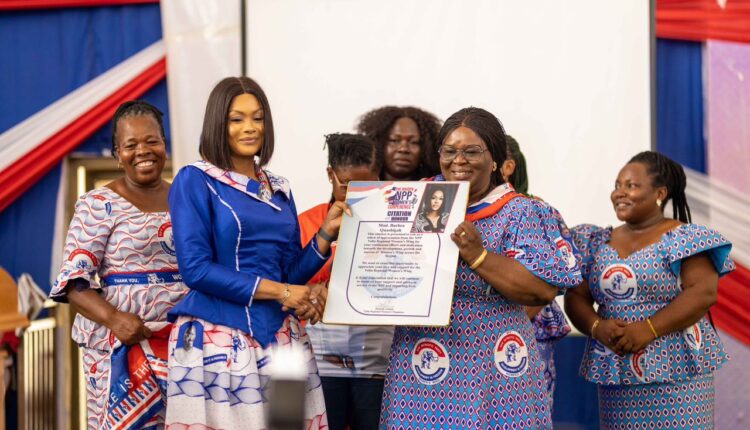In the words of my late father, Major (Rtd) Courage Quashigah, “brighten the corner where you are.” These words resonated deeply when I spoke at the recently held Volta Regional NPP Women’s Wing Conference and Campaign launch in Ho on the topic that has long shaped the landscape of leadership: the role of women in politics and the barriers we face.
Women have made significant strides in political leadership, yet many challenges persist. If we are to surmount these obstacles, we must confront the root causes head-on, reshape structures, and pave the way for more women to excel in politics.
The “Too Soft or Too Tough” Dilemma
A persistent challenge women face in politics is the age-old stereotype that portrays us as either “too soft” or “too tough.” We are often perceived as overly emotional or not decisive enough to lead effectively. These biases skew public perceptions and seep into media coverage, reducing women’s leadership to superficial characteristics rather than focusing on competence. Even within our political parties, these stereotypes take root, questioning the legitimacy of women in positions of power.
However, the tide is turning. Through media campaigns, we can actively combat these stereotypes, showcasing the achievements of women in leadership and reshaping public perception. As Dr. Mahamudu Bawumia aptly noted in the NPP Manifesto, his administration would launch a “Women in Diplomacy” program, giving women an opportunity to showcase their leadership skills on an international stage. With initiatives like these, we can dismantle the gendered lens through which women are unfairly judged.
Empowering Her Voice, Funding Her Future
One of the most pressing challenges women face in politics is securing campaign finance. This challenge stems largely from the fact that financial networks supporting political campaigns are often male-dominated, leaving many women with limited access to the funds needed to run a successful campaign. Without financial resources, women are unable to mobilize, connect with voters, and get their messages across effectively.
To remedy this, political parties must step up. Empowerment programs to help women navigate fundraising challenges would provide critical support. Dr. Bawumia’s proposal for a Women’s Trade Empowerment Fund (WoTEF) is a step in the right direction. By financially empowering women-owned businesses, we enable women to support their political careers. After all, when you support a woman in business, you support her aspirations in all areas, including politics.
The Power of Mentorship and Networks
Mentorship is key to political success, yet women often lack access to influential networks and mentors in the political arena. The absence of strong female role models further exacerbates this issue, leaving many aspiring women politicians without the guidance they need to thrive.
This is why mentorship programs are crucial. Pairing seasoned female politicians with emerging ones can provide the resources and encouragement women need to succeed. As I stand here today, I am grateful for the women who have paved the way for me—my mother, Mrs. Gertrude Quashigah (late), former National Coordinator for the School Feeding Programme, Mrs Agnes Okudzeto, Former First National Vice-Chairman of the New Patriotic Party (NPP), Mawusi Nudekor Awity, Former Director General of TVET, Madam Elizabeth Ohene and many women from the Volta Region. They taught me that it is possible for women to rise to the highest levels of leadership, and with more mentorship opportunities, we can ensure that future generations of women continue to shatter glass ceilings.
NPP: Champions of Women Empowerment
When we talk about women’s empowerment in politics, no political party has done more for women than the New Patriotic Party (NPP). Under President Kufuor’s administration, Georgina Wood was appointed Chief Justice. The Nana-Bawumia administration followed suit, appointing not one but two female Chief Justices—former Chief Justice Sophia Akuffo and current Chief Justice Madam Gertrude Torkornoo. Furthermore, the NPP made history by appointing the first-ever female Chief of Staff, Frema Osei Opare, who has served with distinction for two terms.
The NPP has appointed women to key ministerial positions, proving that women can excel in even the most challenging roles. One notable example is Hon. Ursula Owusu, who has transformed the Ministry of Communications into one of the most effective and resilient ministries. This commitment to women’s leadership continues to inspire many, and with the arrival of our incoming First Lady, Her Excellency Hajia Samira Bawumia, we are poised for even greater strides. Her intelligence, resilience, and humility are a testament to the fact that women are indispensable in governance.
Just last week, we got the good news that our Foreign Affairs Minister, Hon. Shirley Ayorkor has been elected the General Secretary of the Commonwealth, a feat that has put Ghana on the global map.
Looking Forward
As we prepare for the future, it is important to recognize that the journey for women in politics is far from over. There is still much work to be done. We must continue to push for policies that promote gender equality, secure financial independence for women, and foster mentorship programs to ensure that women leaders thrive.
Let us not forget that women hold the keys to Ghana’s future. Together, we can build a more inclusive and diverse political landscape where women are not only represented but celebrated for the unique perspectives they bring to leadership. By brightening our corners, we create a ripple effect of change that extends far beyond our immediate surroundings, shaping a brighter and more equitable future for all.
By Barbara Quashigah – Member, Volta Region New Patriotic Party (NPP) Campaign Committee


Comments are closed.